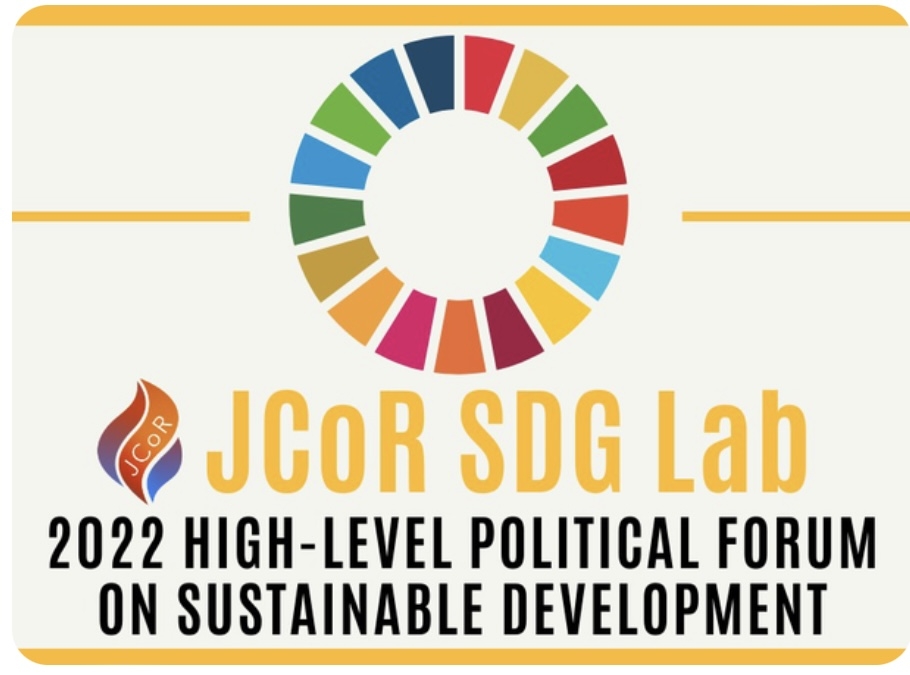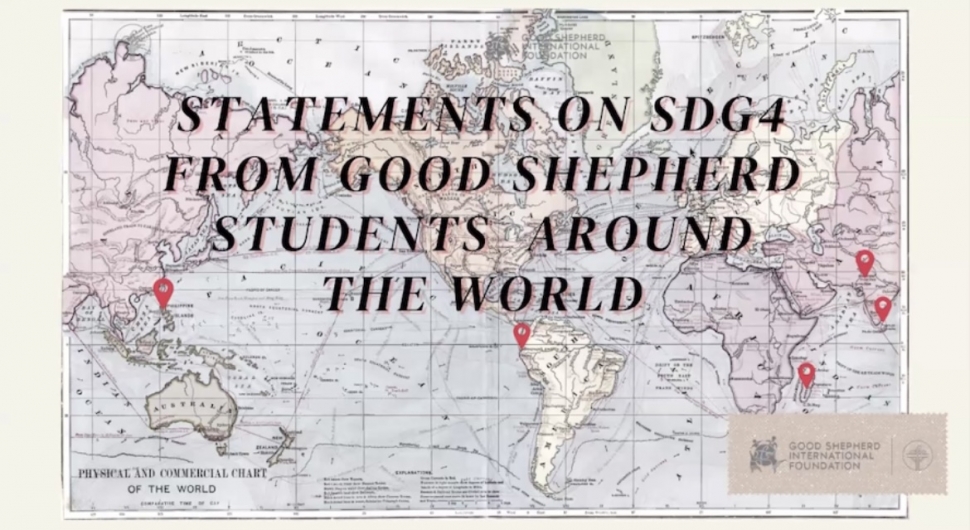Highlights of SDG 4 Quality Education Lab at the 2022 UN High-Level Political Forum on Sustainable Development

On June 5, the first panel for SDG Goal 4 Quality Education was held as part of the 2022 UN High-Level Political Forum on Sustainable Development and organized by the Justice Coalition of Religious, composed of 20 congregations with a presence at the UN.

The panel was opened by presentations of young ladies from India, Sri Lanka, the Philippines, Ecuador, and Madagascar. The ladies are pioneers in leading a global Good Shepherd Pathway for global advocacy by participants at the local level and reaching the international level.
"Learning in all its form is, and always has been essential to shaping young minds, therefore shaping the future" Isabel, 17, Good Shepherd School the Philippines

"To achieve quality education, it is necessary that children have access to appropriate equipment, and there is enough to accommodate them" Autsa, 19, Madagascar.

" I suggest a revolutionary change in Sri Lankan education system inclusive of practical and transferable skills..." Kaiya, 19, Good Shepherd Sri Lanka

"It would be wonderful if the government creates opportunities for children from rural and marginalized sectors to access quality education." Ximena, 17, Ecuador

The next speaker, the representative of “Food for Hungry Minds,” Lay Partner of the Society of the Sacred Heart from the Philippines, has offered an example in which religious ministries and the work of the partners involved paying attention to the fact that education is a very interconnected concept and those who are not experiencing security in other aspects of life face even more significant barriers to educational progress.

Established in 2004, Food for Hungry Minds provides high-quality upper elementary education for the underprivileged. High school and college scholarships are provided for those who qualify. This is a 13 years journey from 4th grade until college graduation. We, in Food for Hungry Minds, choose the whole colors of life for all.
“May we all embark on making the future sustainable for all.”

Ms. Yolanda Jimenez, the speaker from Italy, Rome, Representative of Family of Sacred Heart, has shared her contribution to education for the second generation of migrants in the Schools of Italy.

Religious and ministry partners aim to find the group that has been forgotten, with particular needs and special attention for those needs.
Italian schools have about 10% of their population as second-generation migrants. When looking at target 4.5 of SDG 4, “Ensure each access to all levels of education for the vulnerable,” we understand that migrants and their children are broadly recognized as vulnerable. Article 34 of the Italian constitution says the school is open to all and primary and middle school education is compulsory and framed.

The reality seems slightly different when we look at quality education leading to relevant and effective learning outcomes. Figures show that second generations are three times less likely to have regular schooling than their national peers, which means that second generations are more likely to repeat a year of school. And the figures are nine times more when we look at middle schools. About 40% of second generations in Italy have repeated a year at school against 4.7% of Italian peers.

Non-regular schooling can lead to an early leaving of education. When compulsory school is over, dropouts are three times more likely among second-generation students than Italian students. If you look at the second generation’s age between 17-18, about 12% of them are out of school against 3% of their Italian friends. That’s four times the difference!

Relevant and effective learning outcomes can also be assessed by looking at secondary school options. Second generations of migrants in Italy are less likely to receive the quality education that leads to effective learning outcomes than their Italian friends.
Quality education needs to be understood in a broader context than the school and include family in the learning outcomes of the secondary generations. Mainly, they have an essential role as a teacher in their children's learning outcomes. Still, these learning outcomes can be limited with the migrant families, especially when you consider migrant parents have limited familiarity with the Italian school system. The second-generation speaking another language at home can take it more to associate and master Italian as a language for study.
When the exam is an average mark, the second generation is more likely to choose a technical high school. In contrast, Italian students with similar marks will choose the academic college option. Another consideration is about stereotypes; they seem hard to fade away from nationals and are embodied by migrants themselves.

Some actions that have already been implemented but on a small scale could be disseminated at the national level scale. I would consider migrant associations as a partnership for schools; they can help build communication and participation bridges between the school and the families. I would also consider increasing teachers’ training on multiculturalism, providing them with instruments to orient their non-Italian students and their families. And would pay more attention to mathematics as a potential subject for equality. At the Global level, I would look at embassies that are often underestimated for their role in the integration of second generations. We can look at Italian embassies abroad,
To finalize, I would just have a comment; unfortunately, education has been really focused on reaching mainly sustainable development; there is hardly any consideration for education as an instrument to limit discrimination and increase knowledge.

The last speaker for the JCoR SDG Lab SDG4, Father Benigno, is a member of the Society of the Divine Word, which is part of the UN Congregations known as Vivat International.
"I am the head of the office for the integrity of creation for the society of the Divine Word, Central Province, Philippines. For SDG 4, we are working in partnership with the education department. For inclusivity, the department of education has the burro of alternative learning systems for school dropouts.

10-12 million school dropouts, 15-28 years old’s who have not finished high school. So I got a grant from the government to digitize the modules of lessons in English, Science, and Mathematics. We will digitalize, make it interactive and place it in the e-learning management system so that kids can access them on their cell phones, tablets, and other digital devices. We use animated lessons, virtual reality, augmented reality and AI to monitor the kids.
Our educational philosophy – Learning to think and thinking to learn. No longer to memorize but to teach them to enhance their thinking skills.

Digital transformation of learning is our hope for SDG 4 that we will be able to educate 2030 10 million school dropouts, have them finish high school, and as they finish high school, they will be ready to get digital jobs. We are partnering with Microsoft and Facebook. We have 1000 scholarships from Microsoft, so our kids would become Microsoft office specialists.

When you use computers, you must remember what the Lord said “New wine, new wineskins. “ You must use a new educational philosophy and theory of learning. To teach learners how to become better human beings. Our values are integrity, wholeness, self-realization, solidarity, deeper relationships with God and mother earth, creativity, and design thinking. So, we can teach them how to produce new things out of very eager recourses.
When using the convergence theory of learning to structure the digitalization of the modules of lessons. Our lessons are designed so the kids can learn system thinking, critical thinking, and design thinking. We teach them meta-cognition – what they are doing when they are learning. And especially social and emotional learning to find out their motivation so they would become self-learners, according to SDG 4 lifelong learners.

We digitalize; we use educational technology so the kids would be prepared for the future because we are already in the 4th industrial revolution, the time of the internet, artificial intelligence, robotics, and lots of technological innovations. And we would like kids to learn system thinking, analytic thinking, design thinking so that they would be prepared to work in the future.”
If you want to be up to date with the late news, please register and follow Neya Global on social media.









